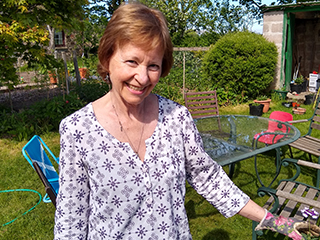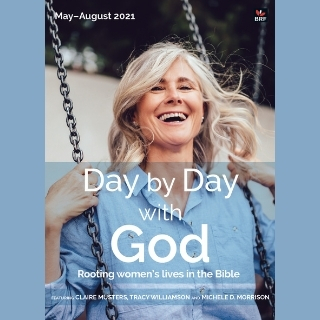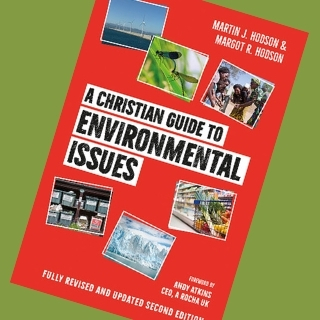In the first of a new series of articles on environmental issues and the climate emergency, Michele D Morrison, a regular contributor to our Bible reading notes, explores our fears and anxieties and says that panic is not the answer. God calls us to a better way…
27 June 2021
Don’t panic!
Greta Thunberg hit the headlines like a modern-day Jeremiah in 2018, when she was only 15 years old. Impassioned and focused, she challenged the world to face up to the reality of climate change. One of her rallying cries was, ‘Adults keep saying, we owe it to the young people to give them hope. But I don’t want your hope… I want you to panic.’
Vintage television show Dad’s Army featured a character, Lance Corporal Jones, whose distinguishing characteristic was his strident call, ‘Don’t panic! Don’t panic!’, while he panicked, rushing aimlessly in circles, going nowhere.
Do not be afraid
In the Bible, God counsels his people, ‘Do not be afraid,’ or words to that effect, 366 times. They are strong words, which most of us need to be reminded of time and time again. They are strong because they are spoken by the source of strength, who loves us unconditionally and promises to take care of us. They are strong because when we love him and lean into him, they impart hope and inspire peace. And when we stand in him, in that position of strength, we can make a difference to whatever catastrophe we face: in this case, the climate emergency.
The American Psychological Association, in a report issued in 2017, described the impact of climate change on mental health as ‘eco-anxiety’, a ‘chronic fear of environmental doom’ from which many are suffering. Eco-anxiety freezes one into a sense of hopelessness and despair. It does not anticipate redemption but destruction. That, I fear, is where Greta Thunberg and many others are stuck.
‘In the Bible, God counsels his people, “Do not be afraid”, or words to that effect, 366 times.’
It’s a position that reckons without our God.
The heart of the emergency
In the series of Bible reflections I have written for the current issue of Day by Day with God, I considered the connectedness between humanity and the earth. In the story of Cain and Abel, Abel joyfully gives God his best, while Cain keeps his best for himself, giving God what he thinks will suffice. It reveals Cain as a calculating individual, who reckons God will happily settle for second-best. His love for God has limits, and those limits have reverberations. Those reverberations undermine his love for his brother Abel (whom he murders), and alienate him from the land itself. The consequences of losing love for God are broken relationships with the whole of God’s creation. This is the heart of the environmental emergency in which we find ourselves.
Jesus says we are to love the Lord our God with all our heart, soul, mind and strength, and to love our neighbour as ourself. These are the two commandments he prioritises, and one can see that one of the consequences of lovelessness is a flagrant, greedy abuse of resources. Though we may lament the loss of the Amazon rainforest, the submersion of south Pacific islands under rising ocean waters or the proliferation of fierce wildfires, if we are not directly adversely affected, we may be unwilling to make the sacrifices necessary to reverse the disastrous course we are on.
A sacrifice we can make for God
Stewarding the planet responsibly is costly, but it is a sacrifice we can make for God. If we truly love him, it is a price we are willing to pay. We will step back from our self-indulgent lifestyles. Cut back on meat consumption. Enjoy a staycation even if it is raining. Minimise our use of plastic.
King David insists on paying Araunah for a cave, declaring that he will not give God an offering that doesn’t cost him anything (2 Samuel 24:24). His love for God is lavish and without limit. It is this level of love to which we should all be aspiring.
Do not be afraid, God says. Panic, an extreme form of fear, paralyses us. Hope, on the other hand – conceived in love and resting in the expectation that God is good, faithful and in control – stimulates us into action and draws us to partner with Jesus, who died to redeem creation.
‘Stewarding the planet responsibly is costly, but it is a sacrifice we can make for God.’
When Eve, then Adam, bit into that forbidden fruit, they dragged all of creation with them out of Eden, out of intimate relationship with God and into a cruel kingdom ruled by the one whom Jesus called the prince of this world. As we recover a close relationship with God, we become increasingly aware of the disastrous result of our careless, selfish abuse of the resources God gave us to steward.
Called to a better way
God calls us to a better way. Come to me, Jesus invites. Draw near to God, scripture advises. God’s way is the way of peace, where love for him inspires respect and care for our sisters and brothers and all of creation. God forgives and restores. As we renew our relationship with him, loving him with all our heart, soul, mind and strength, and loving our neighbours as ourselves, our relationship with the earth will be healed. Let’s celebrate God’s creation, which he loves.
The earth is the Lord’s, and everything in it, says Psalm 24, the world, and all who live in it. May the Lord deliver us all from our myopic, selfish perspectives and help us to recover a deep love for God. Love for his creation, both human and environmental, will then follow.
One day Jesus will return, and heaven will come to earth forever. We do not fear annihilation; as we put our hope in the Lord, we need not panic.

Michele is a freelance writer, who loves listening for God’s voice in the daily routines of life and blogging at tearsamidthealiencorn.blogspot.com and on Facebook. Having raised four children with her husband Don in a sprawling croft in rural Aberdeenshire, she enjoys extending hospitality to friends and family, refugees and others in need of respite, and B&B guests. She also enjoys writing, playing the cello, playing with her grandchildren in Aberdeenshire, Dundee and Glasgow, gardening and leading Bible studies.

Day by Day with God provides a short printed Bible passage, explained and applied especially for women. In the current issue (May-August 2021), Michele writes about caring for creation.

Environmental sustainability is a major issue for us all. In this extensively updated edition, Martin and Margot Hodson consider eight of the key current environmental problems, giving the biblical basis for looking after the environment and helping to integrate environmental thinking into the reader’s understanding of Christian faith.
